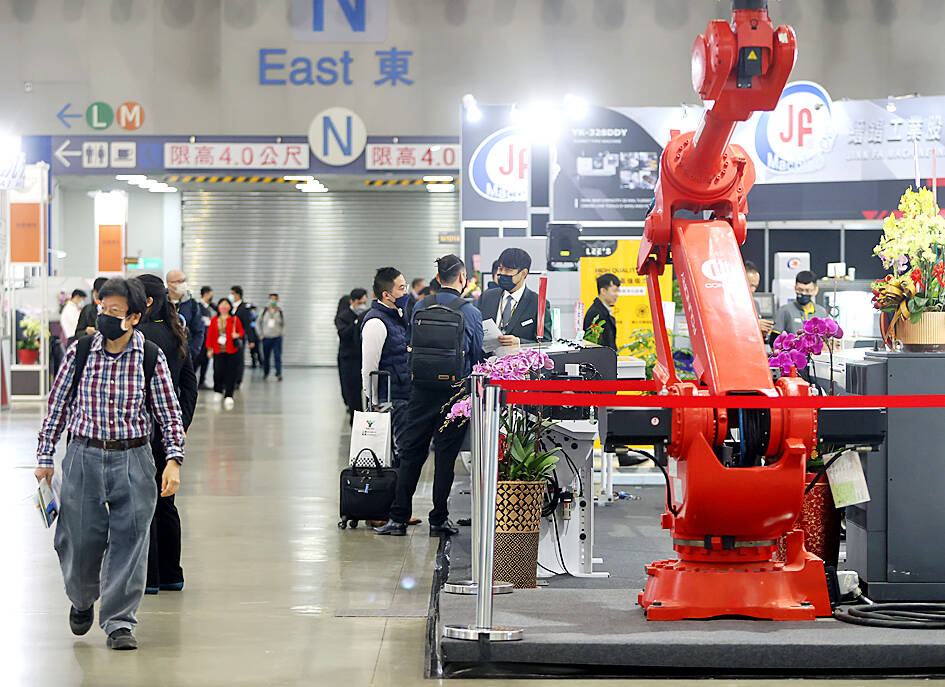The Taiwan Machine Tool and Accessory Builders’ Association (TMBA) yesterday said that it would continue to adhere to government sanctions against specific exports to Russia, but it did not directly address recent news reports that some of its members had been flouting the regulations.
In a statement, the TMBA said that since Russia invaded Ukraine in February 2022, the association has been keeping a close eye on the military conflict and has been reminding its members to stay in line with the export sanctions imposed by Taiwan and other countries.
Since April 2022, the government has been listing goods that are banned from export to Russia, primarily high-tech products.

Photo: CNA
The sanctions on the export of strategic high-tech commodities (SHTC), as they are called, are aimed at preventing their use by countries like Russia, Belarus, Iran and North Korea for military purposes, and at upholding Taiwan’s commitment to international cooperation, the government has said.
The original SHTC list included nuclear energy materials, electronic items, computers, telecommunications and information security products, sensors, lasers, navigation and avionics items, and maritime, aerospace and propulsion systems.
In January last year, the International Trade Administration (ITA) — the government agency that handles such matters — added 52 items to the SHTC list for Russia and Belarus, including chemical products and machine tools.
Citing an investigative report, the Taiwan-based news site The Reporter on Wednesday said that some Taiwanese machine tool suppliers had been taking advantage of the loopholes in export controls to sell sensitive products not only to Russia’s military, but also to its Lebedev Physical Institute and Budker Nuclear Physics Institute, which are on a banned list compiled by the US Department of Commerce.
The Chinese language Liberty Times (sister paper of the Taipei Times) on Tuesday reported that ITA officials had met with representatives of Taiwan’s machinery and machine tool exporters and their business associations earlier in the week, asking them to carefully investigate their clients to prevent breaches of the sanctions.
The TMBA yesterday said that it had asked its members to pay close attention to the sale and distribution of their products so that the goods do not indirectly end up in the sanctioned countries.
The TMBA added that it has advised its members to immediately stop supplying finished machine tool products and components to the sanctioned countries, regardless of whether the products are on the SHTC list.
That is a precaution to prevent the use of those products for unknown purposes, which could accidentally breach international export controls, the TMBA said.

SETBACK: Apple’s India iPhone push has been disrupted after Foxconn recalled hundreds of Chinese engineers, amid Beijing’s attempts to curb tech transfers Apple Inc assembly partner Hon Hai Precision Industry Co (鴻海精密), also known internationally as Foxconn Technology Group (富士康科技集團), has recalled about 300 Chinese engineers from a factory in India, the latest setback for the iPhone maker’s push to rapidly expand in the country. The extraction of Chinese workers from the factory of Yuzhan Technology (India) Private Ltd, a Hon Hai component unit, in southern Tamil Nadu state, is the second such move in a few months. The company has started flying in Taiwanese engineers to replace staff leaving, people familiar with the matter said, asking not to be named, as the

The prices of gasoline and diesel at domestic fuel stations are to rise NT$0.1 and NT$0.4 per liter this week respectively, after international crude oil prices rose last week, CPC Corp, Taiwan (台灣中油) and Formosa Petrochemical Corp (台塑石化) announced yesterday. Effective today, gasoline prices at CPC and Formosa stations are to rise to NT$27.3, NT$28.8 and NT$30.8 per liter for 92, 95 and 98-octane unleaded gasoline respectively, the companies said in separate statements. The price of premium diesel is to rise to NT$26.2 per liter at CPC stations and NT$26 at Formosa pumps, they said. The announcements came after international crude oil prices

SinoPac Financial Holdings Co (永豐金控) is weighing whether to add a life insurance business to its portfolio, but would tread cautiously after completing three acquisitions in quick succession, president Stanley Chu (朱士廷) said yesterday. “We are carefully considering whether life insurance should play a role in SinoPac’s business map,” Chu told reporters ahead of an earnings conference. “Our priority is to ensure the success of the deals we have already made, even though we are tracking some possible targets.” Local media have reported that Mercuries Life Insurance Co (三商美邦人壽), which is seeking buyers amid financial strains, has invited three financial

CAUTION: Right now, artificial intelligence runs on faith, not productivity and eventually, the risk of a bubble will emerge,’ TIER economist Gordon Sun said Taiwanese manufacturers turned more optimistic last month, ending a five-month streak of declining sentiment as concerns over US tariffs, currency volatility and China’s overcapacity began to ease, the Taiwan Institute of Economic Research (TIER) said yesterday. The manufacturing business confidence index rose 1.17 points from June to 86.8, its first rebound since February. TIER economist Gordon Sun (孫明德) attributed the uptick to fading trade uncertainties, a steadier New Taiwan dollar and reduced competitive pressure from Chinese producers. Taiwan’s semiconductor industry is unlikely to face significant damage from Washington’s ongoing probe into semiconductors, given the US’ reliance on Taiwanese chips to power artificial